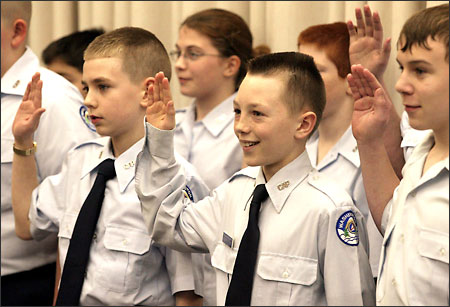
Wednesday, March 5, 2003
By JEFFREY M. BARKER
SEATTLE POST-INTELLIGENCER REPORTER
McCHORD AIR FORCE BASE -- At 11 years old, he's joining the war against terrorism.
Yes, sir. Last night, he became Cadet Airman Cody Stephens, a full-fledged, uniform-wearing, oath-reciting member of the junior division of the Civil Air Patrol, the legendary militia born from the World War II era.
He'll be 12 at the end of the month.
 | ||
| Mike Urban / P-I | ||
| Cody Stephens, 11, at center, joins his classmates in the oath of service during Civil Air Patrol graduation ceremonies held at McChord Air Force Base yesterday. | ||
Fourteen other Tacoma-area cadets -- ages 11 to 18 -- graduated last night in a ceremony at McChord Air Force Base. They and thousands like them across the country are apparently the youngest patriots defending our home turf.
In recent months, the 60,000-member, all-volunteer Civil Air Patrol has been wrapped into the Department of Homeland Security, and the young cadets along with it.
What, exactly, the teenagers will be doing to help hasn't been determined. But their tasks will never put them in harm's way, military and quasi-military officials say.
"It would be more of a support role," said Col. Doug Jones, a Bellingham civilian acting as liaison between the Department of Homeland Security and Washington's branch of the Civil Air Patrol. "We're trying to stress to the cadets and to parents that, yes, it's a war on terrorism, but there's a support role to be played."
Whatever the role, Stephens says he's happy to be doing his part.
"It makes me feel special, kind of," he said. "There are four other cadets my age who are graduating. We all think it's awesome."
Stephens -- a student at Tacoma's Perry Keithley Middle School -- is a young man whose speech is peppered with "yes, sirs" and who answers questions more articulately than you'd expect from an 11-year-old.
Of course, this is a boy who says he's known since age 2 that he wants to fly F-18s. It's that or a career in orthodontics -- it's good to always have a Plan B.
Being a member of the air patrol's junior division might help him get into the Air Force Academy. Yes, sir.
"They'll see that on your application and think, 'He knows his stuff,' " Stephens said.
That was true for Cadet Deputy Commander Carolyn White, a senior at Bellarmine Preparatory School who will attend the U.S. Military Academy in June.
"I attribute my West Point appointment to Civil Air Patrol," she said. "When I joined, I had to step out of being a seventh-grader and into a more military environment.
"I learned a lot about, not just the military, but about life."
The cadet program is similar to the junior ROTC. Students dress the part, stay physically fit and learn about military life.
But now, the cadet program is getting a bit more weighty, with the added duties of Homeland Security -- something a bit tough to grasp.
"It happened right after Sept. 11," is all Stephens said.
Even most adults can't explain all the office encompasses.
"It's still brand new -- so it's a work in progress," said Capt. David Larson, of the McChord Civil Air Patrol squadron. "Homeland security -- that's where Civil Air Patrol started off. We're calling it a renewed mission."
The Civil Air Patrol was formed in 1941, just six days before the attack on Pearl Harbor -- a group of private plane-owners who gathered to help in the war effort.
According to the air patrol's history, men strapped bombs to their small planes and sunk submarines along the Atlantic Seaboard.
The group was registered as a non-profit -- unarmed -- in 1946 and has since concentrated on aeronautics education, search and rescue, and the cadet program.
Its volunteers conduct some 85 percent of all airborne search and rescue operations in the country. Its planes were the only ones in the air, other than military, immediately after the World Trade Center attacks. Last month, air patrol pilots helped look for space shuttle Columbia debris.
The new motto, in light of the Homeland Security duties, is "prepare, prevent, respond," but air patrol officials haven't worked out with Washington state agencies exactly how they will help do those three things.
They're planning on missions such as aerial inspections of the Canadian border and of major infrastructure -- airports, bridges, power plants. And they're readying to help pick up the pieces should a disaster occur.
The cadets will support those missions.
For example, said Jones, if a senior air patrol member takes digital aerial photographs, a cadet might be put in charge of downloading those pictures onto a computer.
"When it comes time to start working with a computer, the best person to get for the job is a teenager," Jones said.
The cadets are not allowed in the air on missions and will always be kept away from danger, he said.
Larson, who is a lawyer for a Seattle firm, followed his son into the patrol. "I was just going to be the chauffeur. But I liked the program so much that I joined," he said. "It's a way for an old fat guy -- no, just kidding -- it's a way to serve my country."
Those interested in finding out more about the Civil Air Patrol can visit www.cap.gov and locate their nearest squadron.
P-I reporter Jeffrey M. Barker can be reached at 206-870-7852 or jeffreybarker@seattlepi.com